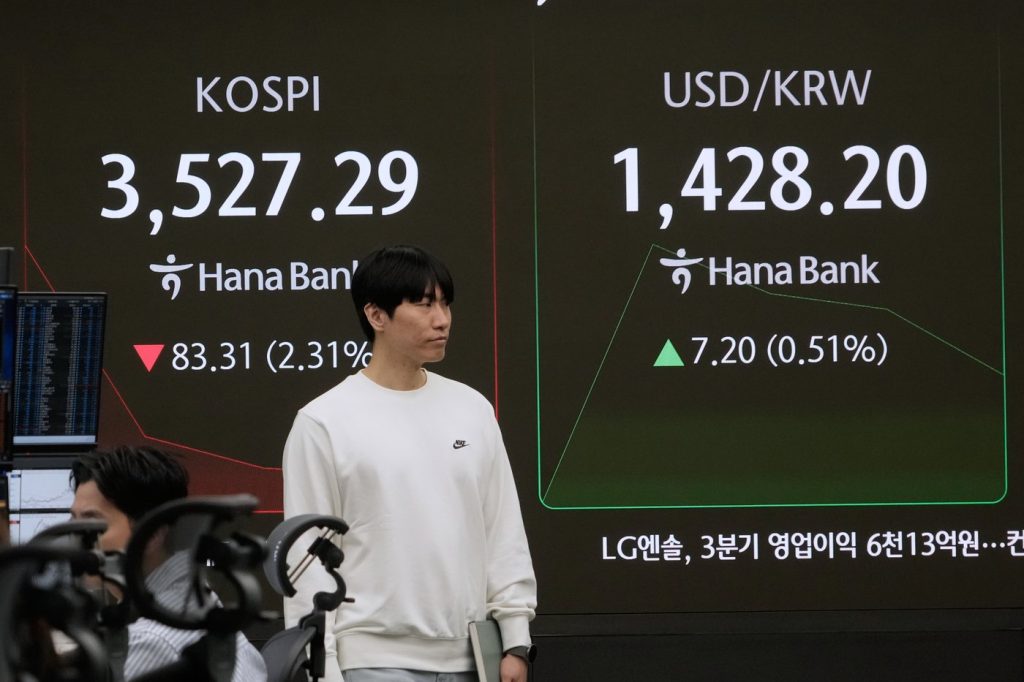Top Stories
Asian Markets Plummet Following Wall Street’s Sharp Decline

Asian shares fell sharply on Monday, reflecting a significant downturn on Wall Street that marked its worst trading day since April. This decline was largely driven by escalating trade tensions with China, following threats from U.S. President Donald Trump to increase tariffs on Chinese goods. The announcement came in response to China’s new restrictions on exports of rare earth materials, which are essential for various industries, including electronics and aerospace.
In the United States, stocks experienced a notable drop on Friday. The S&P 500 fell by 2.7%, closing at 6,552.51, while the Dow Jones Industrial Average decreased by 1.9% to 45,479.60. The Nasdaq Composite faced an even steeper decline, losing 3.6% and finishing at 22,204.43. These losses indicated growing concerns about a renewed trade war between the two largest economies in the world.
China’s trade data revealed contrasting trends. While global exports rose by 8.3% in September compared to the previous year, marking the strongest growth in six months, exports to the United States plummeted by 27% year-on-year. This shift highlights a strategic pivot by Chinese manufacturers, seeking to diversify their markets away from U.S. dependency.
In response to the turmoil, Asian markets reacted negatively. The Hang Seng index in Hong Kong dropped 3.5% to 25,374.00. Other major markets also recorded losses, including the Shanghai Composite, which fell 1.3% to 3,846.25, and South Korea’s Kospi, which declined 1.7% to 3,550.32. The Australian S&P/ASX 200 decreased by 0.9% to 8,882.60, while Taiwan’s Taiex lost 1.7% and India’s Sensex was down 0.5%. Notably, markets in Tokyo were closed for a holiday.
Trump’s comments on social media added to the market’s unease. He stated, “We have been contacted by other countries who are extremely angry at this great trade hostility, which came out of nowhere.” His remarks hinted at potential diplomatic fallout from the escalating tensions, as he suggested that there was “now no reason” to meet with Chinese President Xi Jinping during an upcoming trip to South Korea.
The tech sector faced particularly heavy losses, with significant declines in stocks of major companies like Nvidia and Apple. Roughly six out of every seven stocks in the S&P 500 experienced a downturn, raising concerns over whether stock prices had become inflated relative to corporate earnings.
In the oil markets, prices also demonstrated volatility. The price of a barrel of benchmark U.S. crude fell by 4.2% to $58.90, influenced by a ceasefire between Israel and Hamas that could alleviate concerns regarding oil supply disruptions. Following Trump’s tariff threats, further declines accelerated, with Brent crude, the international standard, decreasing by 3.8% to $62.73. However, early Monday trading saw prices recover slightly, with U.S. crude trading at $59.78 per barrel and Brent at $63.65.
In the bond market, the yield on the 10-year Treasury note decreased to 4.05% from 4.14%, suggesting investor caution amid economic uncertainty. This decline followed a report from the University of Michigan indicating that consumer sentiment in the U.S. remains low.
Currency markets also reflected this turbulence, with the dollar slipping to 151.87 Japanese yen, while the euro strengthened to $1.1627.
As the situation unfolds, the global financial landscape remains under scrutiny, with investors closely monitoring developments in U.S.-China relations and their potential impact on economic stability.
-

 Education4 months ago
Education4 months agoBrandon University’s Failed $5 Million Project Sparks Oversight Review
-

 Science5 months ago
Science5 months agoMicrosoft Confirms U.S. Law Overrules Canadian Data Sovereignty
-

 Lifestyle5 months ago
Lifestyle5 months agoWinnipeg Celebrates Culinary Creativity During Le Burger Week 2025
-

 Health5 months ago
Health5 months agoMontreal’s Groupe Marcelle Leads Canadian Cosmetic Industry Growth
-

 Science5 months ago
Science5 months agoTech Innovator Amandipp Singh Transforms Hiring for Disabled
-

 Technology5 months ago
Technology5 months agoDragon Ball: Sparking! Zero Launching on Switch and Switch 2 This November
-

 Education5 months ago
Education5 months agoNew SĆIȺNEW̱ SṮEȽIṮḴEȽ Elementary Opens in Langford for 2025/2026 Year
-

 Education5 months ago
Education5 months agoRed River College Launches New Programs to Address Industry Needs
-

 Business4 months ago
Business4 months agoRocket Lab Reports Strong Q2 2025 Revenue Growth and Future Plans
-

 Technology5 months ago
Technology5 months agoGoogle Pixel 10 Pro Fold Specs Unveiled Ahead of Launch
-

 Top Stories4 weeks ago
Top Stories4 weeks agoCanadiens Eye Elias Pettersson: What It Would Cost to Acquire Him
-

 Technology3 months ago
Technology3 months agoDiscord Faces Serious Security Breach Affecting Millions
-

 Education5 months ago
Education5 months agoAlberta Teachers’ Strike: Potential Impacts on Students and Families
-

 Business1 month ago
Business1 month agoEngineAI Unveils T800 Humanoid Robot, Setting New Industry Standards
-

 Business5 months ago
Business5 months agoBNA Brewing to Open New Bowling Alley in Downtown Penticton
-

 Science5 months ago
Science5 months agoChina’s Wukong Spacesuit Sets New Standard for AI in Space
-

 Lifestyle3 months ago
Lifestyle3 months agoCanadian Author Secures Funding to Write Book Without Financial Strain
-

 Business5 months ago
Business5 months agoNew Estimates Reveal ChatGPT-5 Energy Use Could Soar
-

 Business3 months ago
Business3 months agoHydro-Québec Espionage Trial Exposes Internal Oversight Failures
-

 Business5 months ago
Business5 months agoDawson City Residents Rally Around Buy Canadian Movement
-

 Technology5 months ago
Technology5 months agoFuture Entertainment Launches DDoD with Gameplay Trailer Showcase
-

 Top Stories4 months ago
Top Stories4 months agoBlue Jays Shift José Berríos to Bullpen Ahead of Playoffs
-

 Top Stories3 months ago
Top Stories3 months agoPatrik Laine Struggles to Make Impact for Canadiens Early Season
-

 Technology5 months ago
Technology5 months agoWorld of Warcraft Players Buzz Over 19-Quest Bee Challenge










